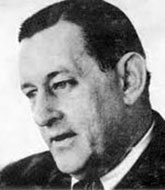John O'Hara
Critique • Works • Views and quotes

Born
Pottsville, Pennsylvania, 1905
Died
Princeton, New Jersey, 1970
Publications
Novels, novellas, stories, plays, essays, screenplays
Genres
Literary, satire, Bildungsroman
Writing language
English
Place of writing
United States
Literature
• Appointment in Samarra (1934)
Novels
• Appointment in Samarra (1934)
Stories
• "Over the River and Through the Wood" (1934)
• "The Doctor's Son" (1935)
Story Collections
• The Doctor's Son (1935)
American Literature
• Appointment in Samarra (1934)
• The Doctor's Son and Other Stories (1935)
On books, writing and writers
1946
I love jazz and I like musicians and composers, and I don't see why I haven't written more about them.... This is true also of other interests of mine: I used to be crazy about football...and yet I've never written a good piece about a football player that was about football. I like saddle horses and horse people and tennis players without much resultant literature, and I think I should have produced a great deal more about pool-playing and pool-players. My name is O'Hara, my mother's name was Delaney, her mother's name was O'Rourke, my paternal grandmother's name was Franey; you might think I'd have had more to say about the Irish.... I confidently expect that when I die I will be mourned by many of my friends who are waiters; where are the waiters in these stories?
Where the hell do I get my material?
Foreword to Here's O'Hara
1950
The most important author living today, the outstanding author since the death of Shakespeare, has brought out a new novel....
The reasons [Ernest] Hemingway is important are not easy to search for, but they are easy to find. They are hard to search for, because he is so competent and deceivingly simple and plain. It is not enough to say that simplicity itself is rare. People are always mailing authors their 9-year-old children's compositions as examples of beautiful simplicity. Simplicity is not rare. And fancy, complicated writing isn't rare either. Every author gets fancy writing in the form of letters and manuscripts from jailbirds, psychopaths and students.
But what Hemingway has—and [John] Steinbeck has it too—is pre-paper discipline. It means, first of all, point of view. A great many non-writers have it without having to reveal it; but with an author it is not only revealing; it often is exposing. A possibly oversimplified definition of point of view would be "feeling and preference" and, in an author's case, the expression of an attitude. It is in the manner and method of the expression of the attitude that writers vary, and before that, the pre-paper discipline—the thinking, the self-editing—gets its test....
To use his own favorite metaphor, he may not be able to go the full distance, but he can still hurt you. Always dangerous. Always in there with that right cocked.
"The Author's Name Is Hemingway", New York Times
1962
...Fighting back at critics, like fighting cops, is a losing proposition from the start and I know it. I knew it on the two or three occasions when I tangled with law enforcement. But I have a long record of defeats of one sort or another, and so I cannot, even in my mellowing late fifties, resist speaking up every two or three years. It seems to me that if we novelists and short story writers and playwrights don't speak up, we deserve to lose out to the unimaginative. If we chicken out in dignified silence we don't even have the fun of making the dullards' victory just a little harder to come by. My own position is a curiously enviable one, and I make no boast of bravery, since I probably have taken more abuse than any of my contemporaries and all I can get is more of the same. Nor is it good enough to say that we fiction people ought to let our work speak for itself, without stooping to literary brawls. What happened to all those pious protests against conformism and the climate of fear?
Come on, you fiction writers and fiction readers. Up our Cause! Have some fun—and don't think this hasn't been.
Introduction to The Cape Cod Lighter
1970
Better than anyone else, he told the truth about his time. He was a professional. He wrote honestly and well.
Self-written epitaph.

